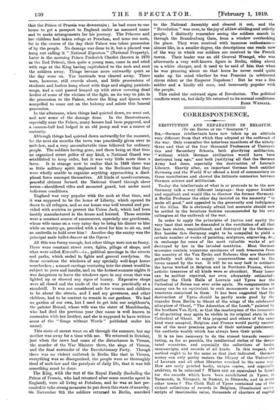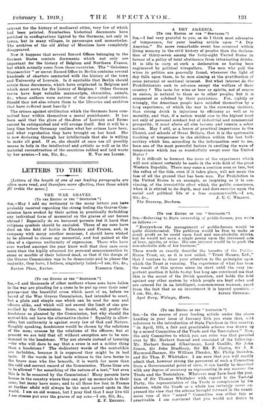CORRESPONDENCE.
RESTITUTION AND REPARATION IN BELGIUM. [To Tire Emma or um:" SPLOIAT011."] Sie,—German intellectuals have now taken up an attitude very different from that which they adopted at the outbreak of the war. Only remember the notorious manifesto of the ninety- three and that of the four thousand Professors of Universi- ties and Secondary Schools, both glorifying militarism, "without which German civilization would have been destroyed long ago," and both justifying all that the German Army had done, especially the destruction of Louvain Library. Shortly after, an important German book entitled Germany and the World War offered a kind of commentary on those manifestoes and showed the intimate connexion between German science and militarism.
To-day the intellectuals of what is or pretends to be the new Germany talk a very different language: they appear humble and suppliant and would like to disavow the former Germany. A. Berlin Professor the other day insisted on the necessity " to make all good," and appealed to the generosity and indulgence of the Allies. He is obviously afraid lest accounts should now be settled in the ferocious fashion recommended by his own colleagues at the outbreak of the war.
In order to apply the principles of justice and equity the very least that must be demanded is the restitution of all that has been stolen, requisitioned, and destroyed by the Germans. But besides this Germany ought to be compelled to yield a certain number of works of painting, eoulpture, engraving, Ac., in exchange for some of the most valuable works of an destroyed by her in the invaded countries. Most German museums contain numerous specimens of such treasures from the country of the Van Eycks and Itubensi they are therefore perfectly well able to supply oompensations equal to the losses caused by the war. It will be no easy task to estimate the havoc worked in Belgium and in Northern France, where artistic treasures of all kinds were so abundant. Many losses can be neither repaired, nor even adequately estimated: neither the Cloth Halls of Louvain and Ypres nor the Cathedral of Reims can ever arise again. No compensation in money can be an equivalent to such monuments or to the art treasures contained in them. It has been suggested that the destruction of Ypres should be partly made goad by the transfer from Berlin to Ghent of the wings of the celebrated altarpiece of Ghent, "The Adoration of the Lamb," painted by the brothers Van Eyck, so that the masterpiece of the inventors of oil-painting may again be visible in its original state in the Cathedral of Ghent. If this proposal and others of the same kind were accepted, Belgium and France would partly recover one of the moat precious parts of their national patrimony. the aesthetic wealth which has always been their pride.
It is no less necessary to do the utmost towards reconsti- tuting, as far as possible, the intellectual riches of the devas- tated countries, and especially the collections of books. manuscripts, and records of all kinds. In this respect, the method ought to be the same as that just indicated. German money can only partly restore the library of the University of Louvain and all other libraries wrecked in the same way. How are early printed books, unique copies, and especially archives, to be returned ? Where can an equivalent be found for the records which have been annihilated in Ypres, in Termonde, in Nieuport, in Namur, in Dixmude, and in many other towns P The Cloth Hall of Ypres contained one of the richest collections of records in Belgium, illuminated manu- scripts of inestimable value, thousands of charters of capital
interest for the history of mediaeval cities, very few of which had been printed. Numberless historical documents have perished in conflagrations lighted by the Germane, not only in towns, but in many villages, in parsonages and monasteries. The archives of the old Abbey of Messines have completely disappeared.
Now it happens that several Record Offices belonging to the German States contain documents which not only are important for the history of Belgium and Northern France, but which actually come from those countries. The " Geheimes Staatearchiv " or secret Record Office in Berlin contains several hundreds of *barters connected with the history of the town and University of Louvain. Is it equitable that Berlin should retain thase documents, which have originated in Belgium and which must serve for the history of Belgium ? Other German towns have kept valuable manuscripts, chronicles, annals, Be., whose authors were natives of the devastated countries. Should they not also return them to the libraries and archivee that have suffered most heavily ?
The crimes against civilization which the Germans have com- mitted bear within themselves a moral punishment. It has been said that the glare of the—fires of Louvain and Reims cannot be extinguished and will avenge itself. But it will be a long time before Germany realizes what her crimes have been, and what reprobation they have brought on her head. She is now declaring through her intellectuals that she is willing to make all good. If so, she should at once use all possible means to help in the intellectual and artistic as well as in the material reconstruction of the countries robbed end laid waste



































 Previous page
Previous page